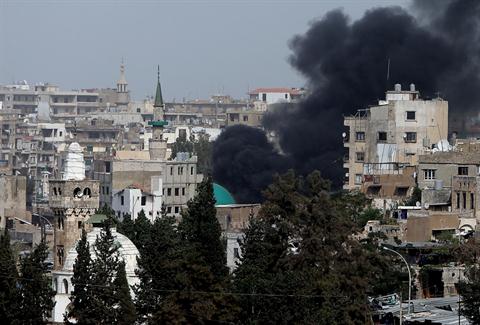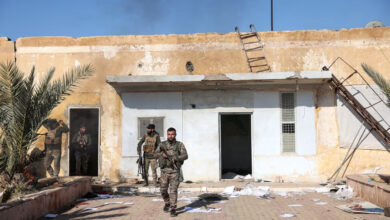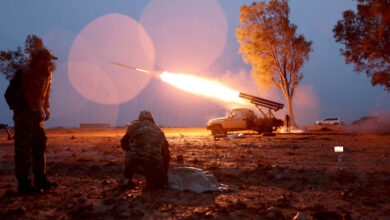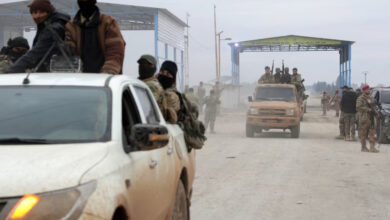
The Lebanese army said it had arranged a ceasefire on Tuesday in the northern city of Tripoli after two nights of fighting between Sunni and Alawite gunmen loyal to different sides in the war in neighboring Syria, a military source said on Tuesday.
At least 10 people have been killed and 65 wounded in clashes in Tripoli despite a heavy deployment of troops backed by tanks and armored personnel carriers.
In the capital Beirut, life was getting back to normal after soldiers swept through the city on Monday to dismantle barricades and clear the streets of gunmen who had clashed on Sunday night.
The violence flared after Friday's assassination in central Beirut of senior Lebanese security official, Wissam al-Hassan, who had worked to counter Syrian influence in Lebanon.
The car bombing and ensuing clashes brought the civil war in Syria into the heart of Lebanon and triggered a political crisis, with the opposition demanding the resignation of the mostly pro-Damascus cabinet of Prime Minister Najib Mikati.
The fighting in Tripoli took place between the neighboring areas of Bab al-Tabbaneh, a Sunni Muslim stronghold, and Jebel Mohsen, an Alawite district. Residents said combatants had traded machine gun-fire and rocket-propelled grenades after nightfall and snipers were active during the day.
A military source told Reuters that after talks with the army on Tuesday both sides had agreed to a halt in the hostilities. However, as evening fell residents reported hearing occasional gunfire.
The army said in a statement it had arrested 100 people since Sunday, including 34 Syrians and four Palestinians, in a security operation aimed at getting guns off the streets.
It said soldiers had raided properties in Beirut and Tripoli where gunmen were sheltering and seized weapons. Fifteen members of the security forces had been wounded by gunfire.
Teenage wasteland
On Tuesday morning, soldiers backed by tanks and armored vehicles were stationed in the streets of Tripoli, which has suffered several previous bouts of fighting since the Syrian conflict started 19 months ago.
But at the front line, they merely looked on as teenaged fighters carrying assault rifles ran up and down the streets.
Shops close to the combat zone were shuttered and the area blocked off with what people called "Bullet Checkpoints" — streets where they feared to go for fear of snipers.
Tripoli's Sunni Muslims support the Syrian rebels fighting to overthrow President Bashar al-Assad, who are mostly from Syria's Sunni majority.
Lebanon is still haunted by its 1975-1990 civil war, which made Beirut a byword for carnage and wrecked much of the city. Many Lebanese fear Syria's war will drag their country back to those days, destroying their efforts to rebuild it as a center of trade, finance and tourism with a semblance of democracy.
Opposition politicians have accused Syria of being behind Friday's killing of Brigadier General Hassan, an opponent of the Damascus leadership.
A Sunni Muslim, Hassan helped to uncover a bomb plot that led to the arrest and indictment in August of a pro-Assad former Lebanese minister. He also led an investigation that implicated Syria and Hezbollah in the 2005 assassination of Rafiq al-Hariri, a former prime minister of Lebanon.
Mikati, who is also a Sunni Muslim, had personal ties to the Assad family before he became prime minister in January last year. His cabinet includes Hezbollah as well as Christian and other Shia politicians close to Damascus.
He offered to resign at the weekend to make way for a government of national unity but President Michel Suleiman persuaded him to stay in office to allow time for talks on a way out of the political crisis.
If he were to stand down before an alternative was worked out, it would mean the collapse of the political compromise that has kept the peace in Lebanon.
Free Patriotic Movement parliamentarian Michel Aoun, a Christian politician and ally of the well-armed Hezbollah, said Lebanon could not live with such a power vacuum.
"What happened (Hassan's assassination) constitutes a security setback but if there was a vacuum, maybe the country would be in chaos," he told the Beirut Daily Star newspaper.
Visiting European Union foreign policy chief Catherine Ashton met Lebanese political leaders in Beirut on Tuesday and stressed the importance of political and social reforms. She also warned of the dangers of a weak state.
"At such times, the importance of robust state institutions that continue to provide security and services cannot be overstated," she told reporters before leaving.
Posters on walls
In Tripoli, Mikati's hometown, resentment was growing among some residents against him and his connection with the Iranian-backed Hezbollah, which is led by Sayyed Hassan Nasrallah.
A protest camp has been set up outside his house.
One protester, Azam Karali, a 47-year-old Sunni jewelry shop owner, said he would stay there until Mikati resigns.
"It was Tripoli that brought him to power but he has now gone to March 8," he said, referring to a group of political parties including Hezbollah who are close to Syria.
"We want our politics to be Lebanese. We don't want Syrian interference, or even American, Iranian, Saudi, whatever."
Posters of the assassinated intelligence chief were plastered on walls all over the city.
"Assad, Nasrallah and Iran made that bomb and we have now lost our protector," said Abu Marwan, a car salesman who had been at the protest camp since Saturday.
But a man called Bassam, an architect, said he supported Mikati and he believed 70 percent of the city did so too.
"This is Mikati's city. He helps us," he said, speaking in a coffee shop. "Tell me, where is the evidence that this bomb was Syrian made?"




